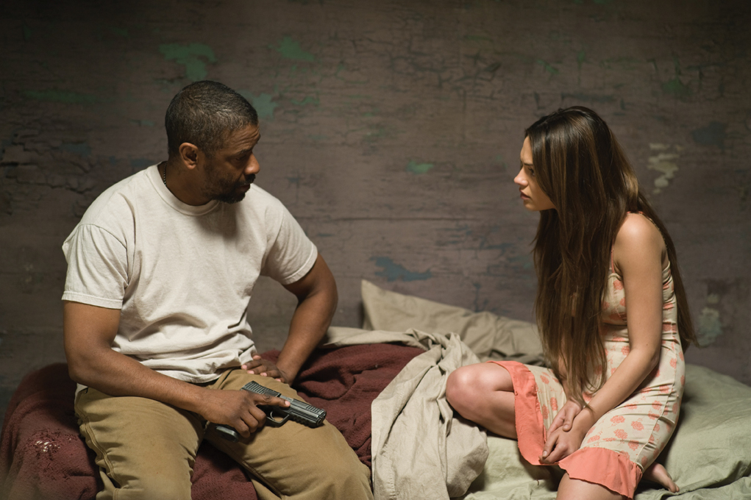Allen and Albert Hughes' spectacular 1993 debut Menace II Society put the spotlight on urban blight and young people whose lives had been stripped of hope, vision and humanity. Their latest, The Book of Eli, offers a variation on that theme, only now it's the entire world that's been destroyed. An appropriately scraggly and weary Denzel Washington plays Eli, who wanders the land carrying a razor-sharp sword and seeking water in drought-ravaged areas 30 years after a nuclear holocaust.
Eli's also among the few surviving literate beings, able to quote passages at length from every section of the Bible he carries, the only copy that survived. He's confident that it can mark a new start for those left on the planet, if he gets it into the right hands. Those do not include Carnegie (Gary Oldman), a fellow book lover and robber baron who presides over a kind of post-apocalyptic Dodge City. Eli defiantly refuses Carnegie's appeals, even turning down the offer of his daughter Solara (Mila Kunis), and he and the girl eventually take it on the lam pursued by Carnegie and his thugs.
Part Western, part sci-fi/martial arts spectacle with frequent forays into Old Testament theology, The Book of Eli never merges these elements into a coherent whole, unless you think a movie can be both a high-minded Christian allegory and a head-chopping comic-book bloodbath. It's never boring, thanks to its ample stylized fight scenes, entertaining asides (especially with wily mechanic Tom Waits and weirdo couple Frances de La Tour and Michael Gambon), and over-the-top climactic encounters with Carnegie and the mysterious, regal Lombardi (Malcolm McDowell).
But the Hughes brothers are so eager to show off their stockpile of second-hand effects, from graphic-novel compositions to the scuffed, ashen look that's the current fashion in post-apocalyptic decor, that the movie sometimes skids toward the ludicrous. Washington makes an adequate philosopher/hero, but Oldman hams up his villainous role so much he erodes the character's effectiveness. Kunis, meanwhile, comes off less a romantic firebrand than an improbably stranded fashion plate.
Neither fully inspirational saga nor swashbuckling action flick, The Book of Eli never moves beyond the superficial. As for its allegorical ambitions, the movie's idea of old-time religion is only 21st century fear-mongering — a quality already too prevalent both inside movie theaters and out.
Email arts@nashvillescene.com






